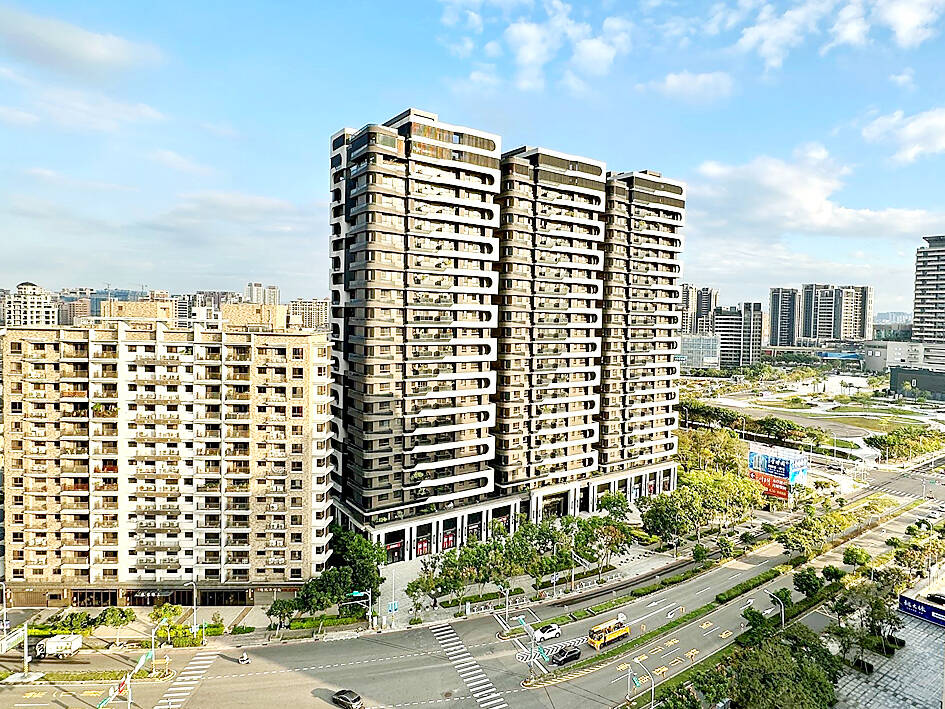Housing transactions in the six special municipalities totaled 26,833 units last month, up 25.6 percent from a year earlier and 17.1 percent higher than in April, as an economic recovery and the government’s property interest rate subsidy underpinned the pickup across Taiwan, real-estate brokers said on Monday.
The volume is the highest since January 2022, with all six municipalities reporting increases of double-digit percentages, Evertrust Rehouse Co (永慶房屋) deputy research head Chen Chin-ping (陳金萍) said, attributing the strong showing to Taiwan’s economic recovery and delivery of presale house projects by developers.
The government’s business climate monitor in April flashed “yellow-red” for the first time in two years, thanks to robust industrial production, imports of machinery equipment, private consumption and local share prices, the National Development Council said last week.

Photo courtesy of Evertrust Rehouse Co
The pace of recovery is expected to gain better momentum going forward, with the high season for technology products approaching, major tech firms said.
Housing deals in Kaohsiung and Tainan reported the fastest annual growth of 47.3 percent and 45.6 percent to 5,194 and 2,843 units respectively, local government data showed.
Tainan and Kaohsiung have become more appealing due to their relative housing affordability and a sharp rise in job opportunities due to the expansion of major tech firms, Chen said.
Taichung also fared well with a 21.4 percent annual increase in home deals to 4,918 units, as improving transport and other infrastructure drew people to buy homes in central Taiwan, she said.
Housing deals surged 19.3 percent year-on-year to 6,636 units in New Taipei City and expanded 16.2 percent to 2,966 units in Taipei, while transactions in Taoyuan rose 14.8 percent to 4,276 units, data from respective administrations showed.
H&B Realty Co (住商不動產) chief researcher Jessica Hsu (徐佳馨) said the government’s interest subsidy for first-time home buyers continued to play an important role in shoring up transactions.
However, Hsu expressed concern that the central bank, which is due to review its monetary policy on Thursday next week, may introduce fresh measures to tighten lending terms if housing transactions and prices continue to gather traction.
The central bank reportedly met with housing brokers and bankers to gain a better understanding of the property market and mortgage operations.
The interest rate subsidy for first-home purchases and other favorable lending terms have come under criticism for negating credit controls and other tightening measures intended to cool the local property boom.
Total transactions in the six special municipalities during the first five months of this year increased 30 percent year-on-year to 112,630 units, the highest for the same period over the past 11 years, data showed.

CHIP RACE: Three years of overbroad export controls drove foreign competitors to pursue their own AI chips, and ‘cost US taxpayers billions of dollars,’ Nvidia said China has figured out the US strategy for allowing it to buy Nvidia Corp’s H200s and is rejecting the artificial intelligence (AI) chip in favor of domestically developed semiconductors, White House AI adviser David Sacks said, citing news reports. US President Donald Trump on Monday said that he would allow shipments of Nvidia’s H200 chips to China, part of an administration effort backed by Sacks to challenge Chinese tech champions such as Huawei Technologies Co (華為) by bringing US competition to their home market. On Friday, Sacks signaled that he was uncertain about whether that approach would work. “They’re rejecting our chips,” Sacks

Taiwan’s exports soared 56 percent year-on-year to an all-time high of US$64.05 billion last month, propelled by surging global demand for artificial intelligence (AI), high-performance computing and cloud service infrastructure, the Ministry of Finance said yesterday. Department of Statistics Director-General Beatrice Tsai (蔡美娜) called the figure an unexpected upside surprise, citing a wave of technology orders from overseas customers alongside the usual year-end shopping season for technology products. Growth is likely to remain strong this month, she said, projecting a 40 percent to 45 percent expansion on an annual basis. The outperformance could prompt the Directorate-General of Budget, Accounting and

NATIONAL SECURITY: Intel’s testing of ACM tools despite US government control ‘highlights egregious gaps in US technology protection policies,’ a former official said Chipmaker Intel Corp has tested chipmaking tools this year from a toolmaker with deep roots in China and two overseas units that were targeted by US sanctions, according to two sources with direct knowledge of the matter. Intel, which fended off calls for its CEO’s resignation from US President Donald Trump in August over his alleged ties to China, got the tools from ACM Research Inc, a Fremont, California-based producer of chipmaking equipment. Two of ACM’s units, based in Shanghai and South Korea, were among a number of firms barred last year from receiving US technology over claims they have

BARRIERS: Gudeng’s chairman said it was unlikely that the US could replicate Taiwan’s science parks in Arizona, given its strict immigration policies and cultural differences Gudeng Precision Industrial Co (家登), which supplies wafer pods to the world’s major semiconductor firms, yesterday said it is in no rush to set up production in the US due to high costs. The company supplies its customers through a warehouse in Arizona jointly operated by TSS Holdings Ltd (德鑫控股), a joint holding of Gudeng and 17 Taiwanese firms in the semiconductor supply chain, including specialty plastic compounds producer Nytex Composites Co (耐特) and automated material handling system supplier Symtek Automation Asia Co (迅得). While the company has long been exploring the feasibility of setting up production in the US to address